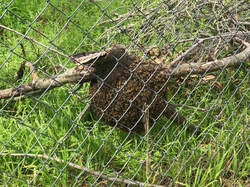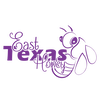|
January is always an awkward month for the beekeeper. There is so much to do, yet the honey flow feels so far away. So, what should the savvy beekeeper be doing right now? Many are spending time building equipment, scouting new areas to place new bees, and dreaming and planning of what the future could hold. If it was a good honey flow the year before, there may still be some bottling and refining of wax going on in the honey house. Most of the time, we spend our time in the planning stages and watching patiently for the bees to come out of winter alive and thriving.
Here in East Texas, our winters are rather mild. We are spending our time checking on the girls, making sure they have enough food to last until the spring thaw, and preparing for splits. We are also in the last stages of preparing for our spring education classes. One of our favorite things to do is to teach new beekeepers the art of managing an apiary. We offer a series of 4 beginner beekeeping classes; one per month from January through April. For folks that already have bees and want to take their apiary to the next level, we also host 4 advanced beekeeping classes, also once per month from January through April. But don't let the "beginner" or "advanced" labels fool you. In all our classes, we cover equipment, best practices, tips and tricks and so much more! Check out each descriptor to determine if the topic is right for you and come join us in the apiary!
0 Comments
July is finally here! With that comes honey harvest time. Whether you are a new beekeeper or a seasoned veteran, honey harvest is one of the most challenging, yet rewarding times of the bee year. It's a time filled with stickiness and laughter and a lot of hard, sweaty work. Our advice to you is to find a few friends to help you out. If nothing else, sharing part of your life with them during this fun and stinging part of the year can create memories that will last a lifetime!
If you are looking for local honey and other fun items, check out our store. We are posting new products daily. Be on the lookout for candles, lip balm, and more! And, of course, there will be honey! See you soon! Wishing you health and happiness this honey season.  March is a busy month for the beekeeper. January and February are spent feeding and prepping bees and materials for optimum production during the honey flow. March is when the plan gets put into action! Beekeepers spend most of the month focusing on good hive management. Splitting hives, acquiring or raising new queens, keeping bees from swarming and catching the lucky swarm that finds its way into the apiary are just some of the tasks beekeepers will be engaged in during this all-important month. During this very hectic time, it is important to be sure your bees have enough food. Pollen is just starting to arrive, as evidenced by the sneezing found in public and the slightly yellow tinge to, well, everything. Pollen patties are a good source of food for your bees. They help stimulate growth and production during the early pollen season. Supplies can be picked up at your local beekeeping shop or online. It's also a good idea to be feeding your bees a syrup substitute. Syrup helps stimulate the hive into production, stimulate the queen into laying to increase numbers, and prepares the hive to do what it does best. Be cautious of the calendar and stop the pollen patties and feeding at the appropriate time. You wouldn't want your supplements to be added to the beautiful honey your bees are about to bring in for your and your family. If you need guidance on best practices or have questions about when, how and what to feed your bees, let us know! We are here to help you manage one of God's most fascinating creatures. God Bless, Christina East Texas Honey would like to invite you to come learn with us! Join us on Saturday, February 22 as we delve into the world of grafting, queen rearing, and hive splitting. Participants will get hands on experience learning how to create a cell builder to raise queens and learn how to graft queen cells. They will also learn how to equalize colonies in preparation to split the hives. Additionally, participants will learn how to properly inspect hives and assess their readiness to be split for the ultimate in honey production!
The class will last from 8:30 am-4:00 pm and lunch is provided. We encourage each participant to bring their own bee suit and gloves. A hive tool and smoker is also advised, but not required. The cost per participant is $75. To register, visit us on Facebook and click the link provided. Please contact us if you have any questions about this event. East Texas Honey Facebook Registration See you on February 22nd! |
The Thomas'Matt is a fourth generation beekeeper and has been in the bees for most of his life. Archives
January 2022
Categories |
Proudly powered by Weebly

 RSS Feed
RSS Feed